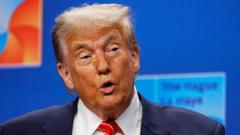Is the Pound's Surge to a 4-Year High a Sign of Trump's Dollar Turbulence?

Understanding the Recent Fluctuations in the Pound and Dollar Exchange Rate
The financial landscape can change dramatically based on political developments and economic policies. Recently, the British pound reached a peak against the US dollar not seen in nearly four years, primarily influenced by market reactions to US President Donald Trump's speculation regarding the Federal Reserve leadership. This article delves into the details of the pound's rise, the implications of Trump's potential actions, and what this means for the broader economy.
The Current State of the Pound and Dollar
As of late October 2021, the pound rose above $1.37, marking the highest level since October 2021. This increase reflects traders' reactions to the possibility that President Trump may hasten the appointment of a new head of the Federal Reserve, Jerome Powell's potential replacement. The dollar's subsequent weakening can be attributed to uncertainty surrounding Trump's intentions and the implications for US monetary policy.
The Impact of Political Speculation on Currency Valuation
Political events significantly affect currency values, especially in a globally interconnected economy. The Wall Street Journal's report indicating that Trump was contemplating naming Powell's successor by September or October sent ripples through the foreign exchange markets. The dollar weakened as traders anticipated a shift in monetary policy that could favor Trump's economic agenda.
The Role of the Federal Reserve
The Federal Reserve (often referred to as the Fed) operates independently from the government, and its chair plays a pivotal role in determining interest rates. Currently, the Fed has kept interest rates unchanged throughout the year, despite President Trump's criticisms of Powell. Trump's recent remarks about Powell being "terrible" highlight the political tensions surrounding the Fed's operations and decision-making processes.
Understanding Interest Rates and Their Economic Implications
Interest rates are crucial in shaping economic activity, affecting everything from consumer spending to business investment. When interest rates are low, borrowing becomes cheaper, which can stimulate economic growth. However, if rates are perceived as being too low, it can lead to inflationary pressures.
In recent months, the Fed has expressed caution regarding the impact of Trump's proposed tariffs, which could increase costs for businesses. These tariffs are intended to protect American industries but may lead to higher prices for consumers if implemented. The Fed's careful approach signals its commitment to monitoring economic indicators closely before making any drastic changes to interest rates.
Economic Growth and Recession Risks
The US economy experienced a contraction in the first quarter of the year, marking its first decline in three years. Factors contributing to this downturn include reduced government spending and a surge in imports as businesses rushed to stockpile goods before tariffs took effect. Economic analysts, including those at JP Morgan, have downgraded the likelihood of a recession this year, estimating a 40% chance of a slowdown amidst ongoing uncertainty.
Market Sentiment and Currency Trading Strategies
Traders are adapting their strategies based on the evolving political landscape and economic forecasts. According to Kaspar Hense, a senior portfolio manager at RBC BlueBay Asset Management, there is a prevailing sentiment that the dollar will weaken further, particularly in an environment characterized by perceived institutional instability. This sentiment is echoed by Kit Juckes, chief FX strategist at Societe Generale, who suggests that the market is adjusting expectations in anticipation of a more sympathetic successor to Powell, should Trump proceed with his plans.
The Historical Context of the Federal Reserve Chair Appointments
Jerome Powell was appointed by Trump during his first term, replacing Janet Yellen, who faced criticism from Trump for maintaining low-interest rates. Yellen, who now serves as the US Treasury Secretary under President Joe Biden, has previously remarked on Trump's limited understanding of macroeconomic policies. This backdrop adds complexity to the current discussions surrounding the Fed's leadership and its implications for monetary policy.
Why the Federal Reserve Chair Matters
- Influence on Interest Rates: The Fed chair plays a crucial role in setting interest rates, impacting borrowing costs and economic growth.
- Market Confidence: The leadership style and policy direction of the Fed chair can significantly influence investor confidence and market stability.
- Economic Policy Direction: A chair aligned with the president's economic philosophy may lead to more aggressive monetary policies, potentially increasing inflation.
What Lies Ahead for the Pound and Dollar Exchange Rate
The future of the pound and dollar exchange rate hangs in the balance as investors closely monitor developments in US monetary policy and political dynamics. Should Trump proceed with appointing a new Fed chair who aligns more closely with his economic views, the dollar could face further pressure. Conversely, if Powell remains in his position or a more neutral figure is appointed, the dollar might stabilize.
The Role of Economic Indicators
Key economic indicators, such as employment rates, inflation, and GDP growth, will continue to play a vital role in shaping currency valuations. As the Fed navigates the complexities of economic recovery amidst ongoing trade tensions, traders and investors alike will be watching closely for signs of shifts in monetary policy.
Potential Scenarios for Currency Traders
Traders can prepare for potential shifts in the currency market by considering various scenarios:
- Scenario 1: If Trump appoints a Fed chair who aligns with his views, the dollar may weaken further, resulting in a stronger pound.
- Scenario 2: Should Powell remain in his position, the dollar could stabilize, potentially leading to a more balanced exchange rate.
- Scenario 3: If economic indicators show signs of recession, both currencies may experience volatility, affecting investor confidence.
Conclusion
The fluctuations in the pound versus the dollar exchange rate exemplify the intricate relationship between politics and economics. As markets react to the potential appointment of a new Federal Reserve chair, understanding the implications for interest rates, economic growth, and market sentiment becomes essential for traders and investors. The coming months will be pivotal in shaping monetary policy and determining the future trajectory of both currencies.
FAQs
How does the Federal Reserve influence currency exchange rates?
The Federal Reserve influences currency exchange rates primarily through its control of interest rates. Changes in interest rates can affect inflation and economic growth, which in turn impacts investor confidence and currency valuation.
What impact do political events have on currency markets?
Political events, such as elections or changes in leadership within central banks, can create uncertainty in currency markets, leading to fluctuations in exchange rates as traders react to potential changes in economic policy.
Why is the appointment of a new Fed chair significant?
The appointment of a new Fed chair is significant because it can shift the direction of monetary policy, impacting interest rates, inflation, and overall economic stability, which subsequently influences currency values.
As we move forward, it will be fascinating to see how these dynamics unfold and their implications for global markets. Are you prepared for the potential shifts in the currency landscape? #CurrencyExchange #FederalReserve #EconomicPolicy
Published: 2025-06-26 14:27:04 | Category: technology



